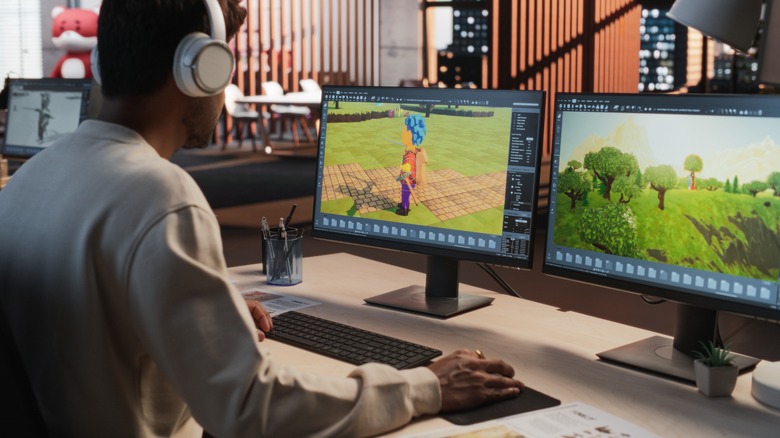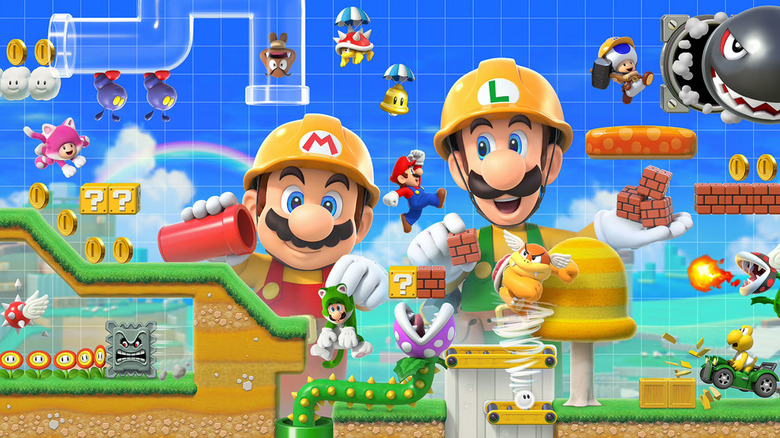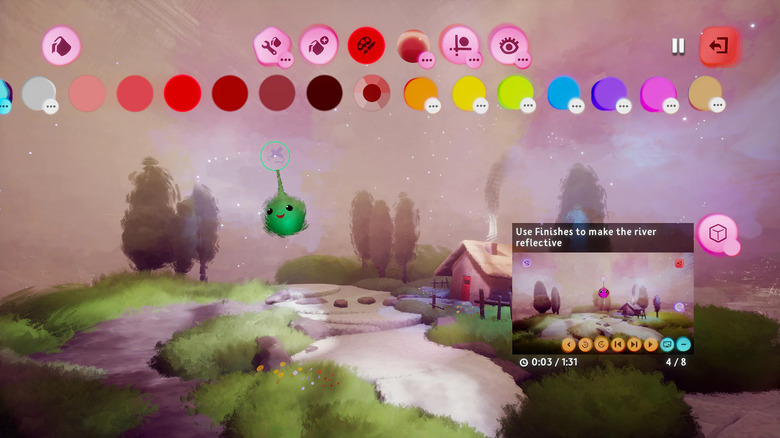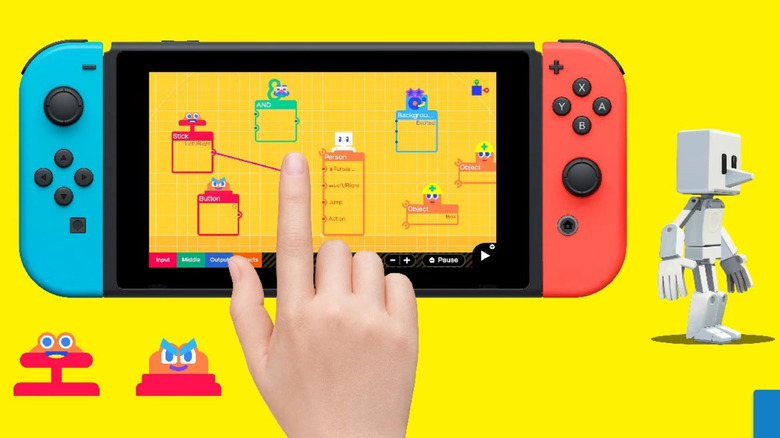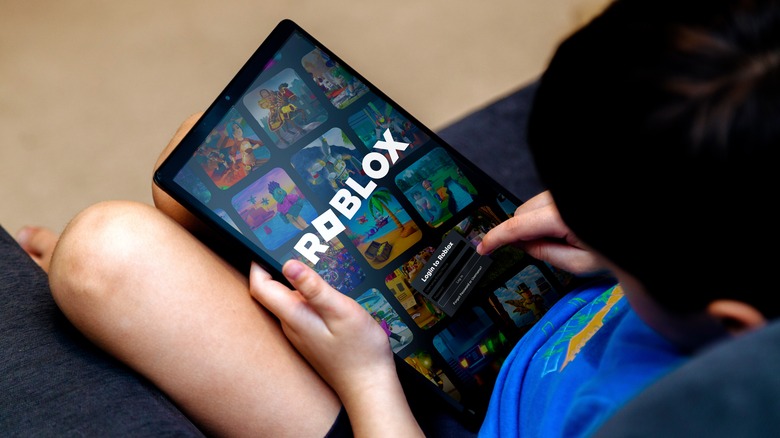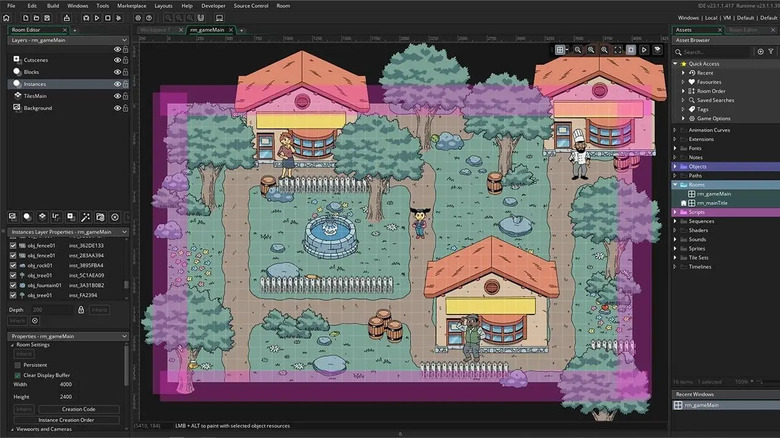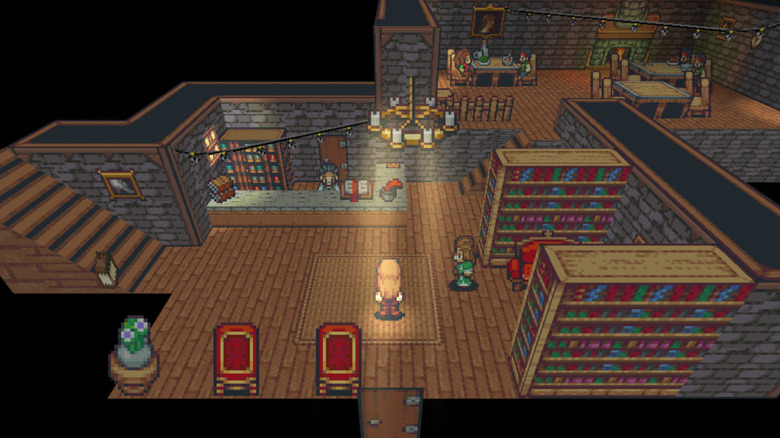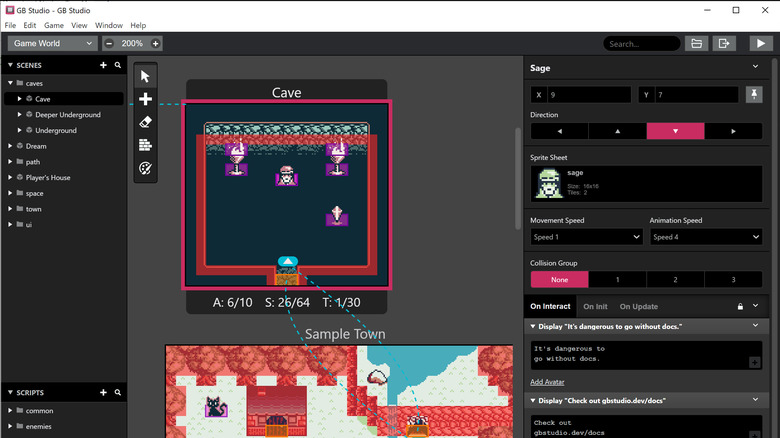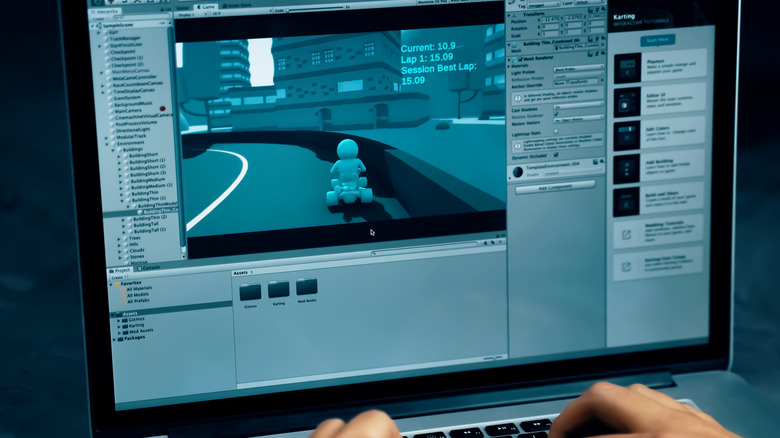9 Game Development Software Tools Perfect For Beginners
The video game industry is now bigger than it has ever been before, with more and more young people interested in developing their very own video games –- and rightly so. After all, game development offers an exciting and imaginative outlet where creativity is free to run wild.
However, because of the high skill level required for development, many eager game developers often struggle with making their first games. Thankfully, there is no shortage of paid and free game development tools, and plenty of great options for beginners -– many of which require zero to little programming knowledge. You can start with something simple, such as the integrated tools in "Super Mario Maker 2," and work your way up to more powerful game making suites such as Unity.
To guide you on that journey, we've put together a list of nine excellent game development tools that beginners should check out when first starting off with game development.
Super Mario Maker 2
While at the end of the day it is more of a level editor rather than a true game maker, "Super Mario Maker 2" is so robust that it serves as an excellent introduction to the basics of game design. In essence, the game allows users to design and create their levels within the well-known "Super Mario Bros" universe, a familiar reference point that eases players' abilities to experiment with game development concepts.
One of the biggest advantages of "Super Mario Maker 2" is its simplicity and accessibility. Players start with a familiar foundation, so there's no need to learn complex mechanics before diving into creating levels. The level editor provides all the essential tools for designing everything from platform layouts to enemy placements. It's easy to understand but still offers enough complexity for players to develop their skills over time.
This game serves as an excellent teaching tool for level design. Players learn about player progression, difficulty balancing, and how level elements like obstacles and power-ups interact with each other. "Super Mario Maker 2" emphasizes the importance of flow and pacing in a level, helping players gain an appreciation for the delicate balance that good game design requires.
Additionally, the ease of sharing creations with others allows for instant feedback and improvement. It's a great way to engage with a community, exchange ideas, and refine skills. "Super Mario Maker 2" offers a welcoming entry point into the world of game creation, teaching the fundamentals in a fun and approachable way. It's a perfect stepping stone for anyone looking to break into the game development world without the need for technical expertise.
Dreams
Like "Super Mario Maker 2," "Dreams" is a video game that features a creation mode within it. Unlike "Mario Maker," the creation tools offered in "Dreams" are robust, versatile, and allow players to create just about any type of game that they can think of.
Developed by Media Molecule -– the creators of the "LittleBigPlanet" series –- "Dreams" is a PlayStation 4 title that allows players to create their own games, animations, music, and more. It's a highly flexible creation tool, blending accessibility with depth to accommodate creators of varying skill levels. The intuitive interface simplifies complex development processes by using visual scripting and drag-and-drop functionality, enabling users to focus on their creative vision.
One of "Dreams"' strongest features is its collaborative aspect. Players can easily share creations within the community, remix others' projects, or team up to build something entirely new. This community-driven approach not only sparks inspiration but also provides a platform for feedback and growth. Tutorials are embedded within the tool, offering step-by-step guidance on using its extensive features, from sculpting models to designing gameplay mechanics.
By simply taking a look at some of the user-created content, it's obvious just how robust "Dreams"' features truly are. Creations range from puzzle platformers to action RPGs, to remakes of existing titles such as a one-for-one recreation of Hideo Kojima's "P.T." All of these factors make "Dreams" perfect for beginners who want to explore multiple aspects of game creation without needing a PC or being overwhelmed by technical details. As a sandbox for creativity that emphasizes experimentation and collaboration, it's an excellent entry point for aspiring game developers.
Game Builder Garage
"Game Builder Garage" is a Nintendo Switch game that teaches users the basics of game development, with zero programming required and intuitive controls. It's a user-friendly tool that employs visual programming to help players understand the fundamentals of creating games. The interface is accessible, breaking down complex programming logic into manageable steps by using Nodons, which are blocks that represent different game functions.
While "Game Builder Garage" seems to have a lot in common with Dreams –- both are console-exclusive game creation tools, after all -– it should be noted that one is much more limited than the other. "Game Builder Garage," while serving as a great entry point for teaching players about game development, does not offer as many features as "Dreams." This means that it is arguably more useful for educating younger players about the basics of game programming rather than a robust tool for developing fully fleshed out games.
With that said, "Game Builder Garage" still offers quite a lot to beginners. The game's extensive tutorials guide users through the process, ensuring they grasp essential concepts like player input, object interaction, and conditional logic. Players can create diverse genres of games, from platformers to shooters, and customize mechanics to suit their vision, with tons of awesome user-created levels as proof of the game's potential.
This tool is particularly suitable for younger audiences or complete beginners who want a playful introduction to game development. The hands-on approach makes learning engaging and fun, turning complex concepts into a gamified experience.
Roblox
Yes, you read that right –- that one game that your eight-year-old nephew spends all day in his room playing is also an excellent tool for game development. You see, "Roblox" is more than a game — it's a platform that allows users to create, publish, and monetize their games. Known for its massive user base and robust development tools, Roblox Studio is an awesome starting point for younger developers or anyone with minimal experience looking to dip their toes into game development. The platform uses Lua scripting, a beginner-friendly programming language, with loads of tutorials and documentation available online to help new users get started.
The appeal of "Roblox" lies in its accessibility and active community. Aspiring developers can find countless resources created by other users, including assets, scripts, and detailed guides. With the ability to publish games directly to the "Roblox" platform — which users can play on anything from an Amazon Fire tablet to a desktop PC — developers can instantly receive feedback on their creations, iterate on their designs, and even earn revenue.
For beginners, "Roblox" serves as a gateway to understanding game development fundamentals, from scripting to level design. It also introduces users to the business side of game creation, providing valuable experience for those considering a career in the industry. For something most deem as a game primarily for kids, "Roblox" is an awesome creation tool. Whether or not you've played the game before, we can't recommend "Roblox" enough.
GameMaker
The first proper standalone software tool of this list, GameMaker is a straightforward development tool that skirts the line between simple and complex. As opposed to game engines like Unity which can be challenging for users without programming backgrounds, GameMaker offers intuitive and easy drag-and-drop functionality and a beginner-friendly scripting language called GML (Game Maker Language). Its intuitive interface and versatile tools make it ideal for creating 2D games across many different genres, from platformers to RPGs.
While you're encouraged to start with the drag-and-drop tools available, the software also allows users to gradually transition to coding as they gain confidence. This scalability makes it suitable for users of all skill levels. The software offers the potential for creating some truly great and complex games, with noteworthy games such as "Undertale" and "Hotline Miami" both being developed using it.
With an active community and a wealth of tutorials available online, GameMaker is an excellent choice for beginners looking to develop their first games. It's a versatile tool that grows with its users, making it a valuable stepping stone in for anyone interested in learning more about game development.
RPG Maker
If you are a fan of old-school top-down RPGs like "Dragon Quest" or "Final Fantasy," then RPG Maker may be a great option for you. Users interested in crafting their very own role-playing games should consider "RPG Maker," as the software's pre-built systems do all of the challenging work and make developing RPGs easier than ever.
With features like turn-based combat, customizable character sprites, and map-building tools already included, RPG Maker allows creators to primarily focus on level design, storytelling, and dialogue rather than programming.
As a result, this software is ideal for players who want to primarily focus on worldbuilding and storytelling over gameplay. It's an ideal choice for beginners who want to create detailed, narrative-rich games with minimal technical expertise. Just taking a quick look at some of the popular games — many of which are playable on popular handheld devices like the Steam Deck — that have been created with RPG Maker over the years is proof of the tool's great potential. Examples of great games developed with RPG Maker include "Fear and Hunger," "Lisa: The Painful," and "To the Moon."
Twine
Twine's website aptly refers to itself as "an open-source tool for creating interactive, non-linear stories." Twine is perfect for aspiring narrative designers, or writers interested in writing for games, as the tool is one of the simplest and easiest game development tools to pick up and use. The tool is useful for writers looking to showcase or practice their branching narrative writing. Another great perk of Twine is that games are published directly to HTML, so you can post your work pretty much anywhere, and even for commercial purposes.
Despite its simplicity, Twine still offers quite a lot of great features, including the ability to additional media like music and images, and more complexities like additional variables, conditionals, and programming to turn a straightforward choice-based narrative into a game that remembers user choices over time. This includes basic things like remembering the player's name, to more elaborate game design elements such as requiring the player to pick up a key item, such as a key to a locked door, and using the key to unlock it.
Overall, Twine is generally a fairly basic and limited game design tool, but its simplicity makes it very easy for beginners to pick up and use. If you're looking for an easy game development tool or specifically want to practice your narrative design skills, Twine may be perfect for you.
GB Studio
GB Studio is a tool that allows users to create their very own Game Boy games. The software, while somewhat limited in its capabilities, is a great option for beginning developers who want to work within strict constraints. Games are limited to just four colors, 20 actors, and 30 triggers per area or scene. Additionally, since the program is for developing Game Boy games, it only supports a very limited button input. While this may sound like a downside, it's great for beginners as it forces them to create more focused games that must abide by tight parameters.
When starting a new project, players can select from two distinct perspectives — top-down, or side-scroller. Top-down is perfect for adventure games in the style of "The Legend of Zelda" or "Final Fantasy." The side-scrolling style is ideal for 2D platforming games like "Super Mario Bros." Both of these game types are pretty basic, with little additional features available.
Games can either be exported to play on Itch.io, an emulator, or any hardware that can play Game Boy games, including official Game Boy handhelds, the Analogue Pocket, or any emulation handhelds. GB Studio is an excellent choice for anybody looking to craft very basic games while working under tight constraints.
Unity
Everyone has heard of Unity at this point, and for good reason. It's widely considered one of the best game engines for beginners for many reasons — its user-friendly interface, extensive learning resources, versatility, and many other reasons all make it great for first-time developers. The engine supports both 2D and 3D game development, which allows users to develop games in virtually any genre. Unity also uses C#, which is a pretty simple programming language, making the engine accessible to even those with minimal coding experience.
Like many of the other tools on this list, one of Unity's greatest strengths is its community. With countless tutorials, forums, and documentation available, beginners can quickly find answers to their questions and learn at their own pace with zero prior experience. The engine also offers a free version, which further lowers the barrier to entry for aspiring developers. Unity's versatility and scalability make it an excellent choice for beginners and experienced developers alike. It's a powerful tool that can grow with its users, serving as a stepping stone to professional game development.
Unity is used by countless game developers, with titles developed from it including "Hollow Knight," "Fall Guys," "Outer Wilds," "Beat Saber," and so many more. Despite some controversial rule changes that have impacted larger developers in recent years, Unity still remains one of the greatest game engines for beginners, as it offers endless possibilities for game creation.
